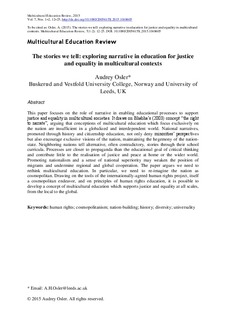The stories we tell: exploring narrative in education for justice and equality in multicultural contexts
Journal article, Peer reviewed
Accepted version

View/
Date
2015Metadata
Show full item recordCollections
Abstract
This paper focuses on the role of narrative in enabling educational processes to support justice and equality in multicultural societies. It draws on Bhabha’s (2003) concept “the right to narrate”, arguing that conceptions of multicultural education which focus exclusively on the nation are insufficient in a globalized and interdependent world. National narratives, promoted through history and citizenship education, not only deny minorities’ perspectives but also encourage exclusive visions of the nation, maintaining the hegemony of the nation-state. Neighboring nations tell alternative, often contradictory, stories through their school curricula. Processes are closer to propaganda than the educational goal of critical thinking and contribute little to the realisation of justice and peace at home or the wider world. Promoting nationalism and a sense of national superiority may weaken the position of migrants and undermine regional and global cooperation. The paper argues we need to rethink multicultural education. In particular, we need to re-imagine the nation as cosmopolitan. Drawing on the tools of the internationally-agreed human rights project, itself a cosmopolitan endeavor, and on principles of human rights education, it is possible to develop a concept of multicultural education which supports justice and equality at all scales, from the local to the global.
Keywords: human rights; cosmopolitanism; nation-building; history; diversity; universality
Description
-